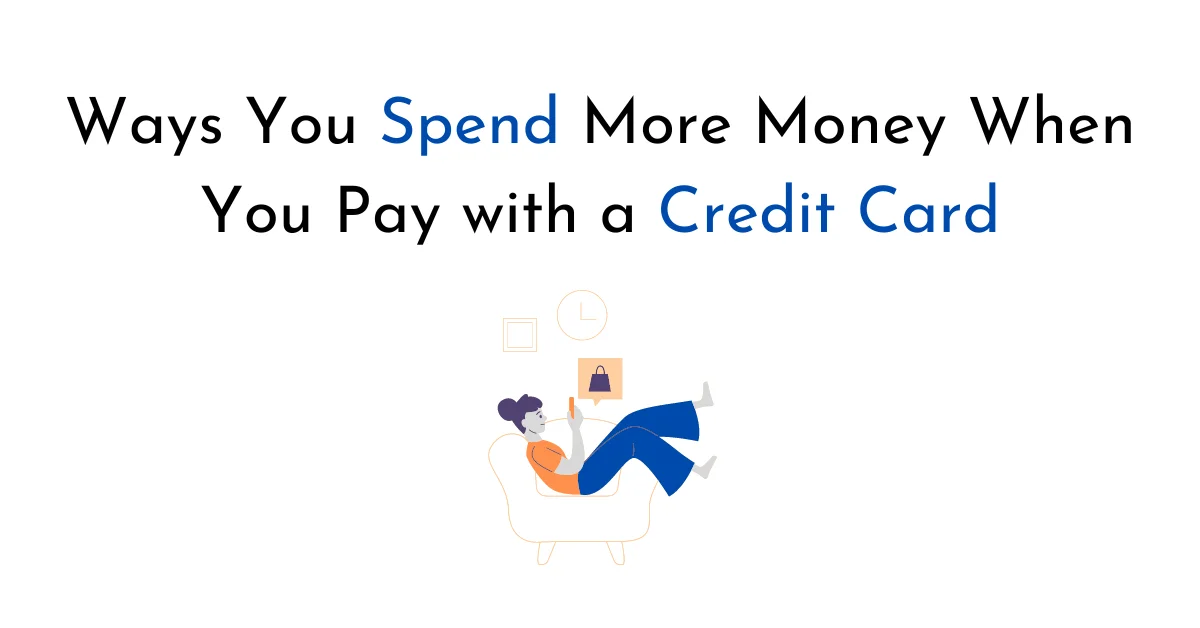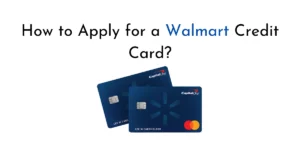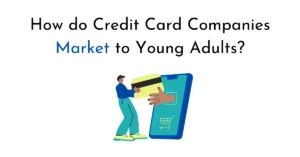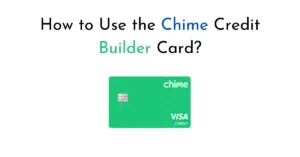Credit cards have revolutionized the way we make payments, offering convenience, security, and rewards.
By being aware of these factors, you can make informed decisions about when and how to use your credit card, ensuring that it aligns with your financial goals.
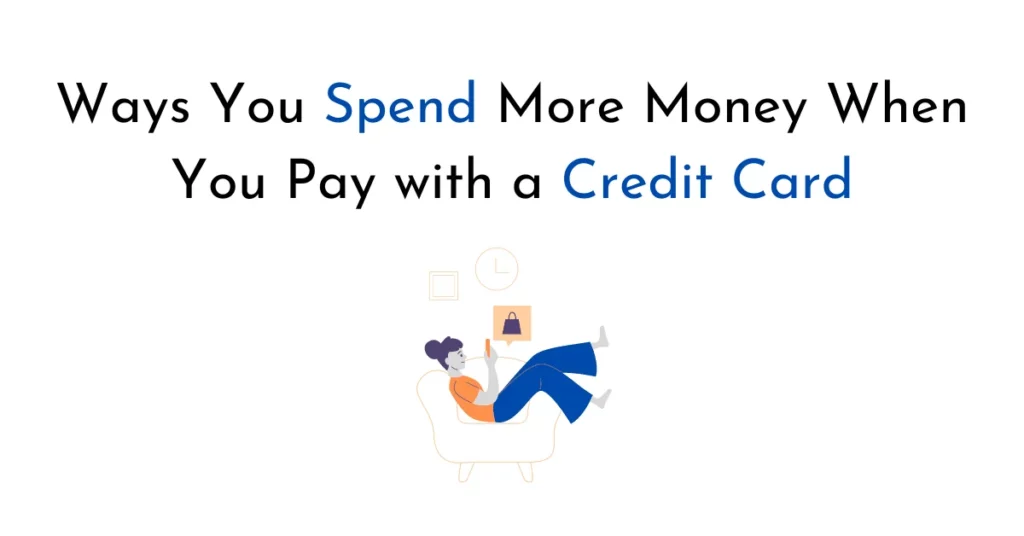
Ways You Spend More Money When You Pay with a Credit Card
While credit cards offer benefits such as rewards and convenience, there are several factors to consider that can result in increased expenses.
Let’s check the ways paying with a credit card can impact your finances:
- Interest Charges: If you carry a balance on your credit card from month to month, interest charges can quickly accumulate. Credit cards typically have high-interest rates, especially if you have a suboptimal credit score. Paying interest on your purchases adds to the overall cost and can be a significant financial burden over time.
- Minimum Payment Trap: Credit card companies often require a minimum payment each month. While making only the minimum payment can help avoid late fees, it extends the time it takes to pay off your balance, resulting in more interest charges. To avoid this trap, strive to pay off your credit card balance in full each month.
- Annual Fees: Some credit cards come with annual fees that are charged regardless of your usage. These fees can range from a few dollars to hundreds of dollars per year. If you don’t fully utilize the card’s benefits or rewards to offset the annual fee, it becomes an additional expense.
- Foreign Transaction Fees: When you use your credit card for purchases in foreign currencies or when traveling abroad, foreign transaction fees can apply. These fees are typically a percentage of the transaction amount and can quickly add up, making your purchases more expensive.
- Cash Advance Charges: If you use your credit card to withdraw cash from an ATM or obtain cash-like transactions, such as purchasing gift cards or casino chips, you may incur cash advance fees and higher interest rates. Cash advances often have no grace period, which means interest starts accruing immediately.
- Balance Transfer Fees: Balance transfers can be a useful tool to consolidate debt and take advantage of lower interest rates. However, credit card companies may charge balance transfer fees, usually a percentage of the transferred balance. It’s essential to factor in these fees when evaluating the cost-effectiveness of a balance transfer.
- Credit Card Rewards Temptation: Credit card rewards can be enticing, but they may lead to impulsive spending. Some rewards programs encourage you to spend more to earn more rewards, which can result in unnecessary purchases or overspending. It’s crucial to maintain discipline and only make purchases you genuinely need or can afford.
- Late Payment Penalties: Missing credit card payment deadlines can lead to late payment penalties, which are additional charges added to your balance. Late payment fees can range from moderate amounts to significant percentages of your outstanding balance. It’s crucial to make timely payments to avoid these fees.
- Overlimit Fees: If you exceed your credit card’s approved credit limit, overlimit fees may apply. These fees can be a fixed amount or a percentage of the exceeded limit. It’s important to monitor your credit card balance and credit limit to avoid overlimit fees, as they can quickly add to your expenses.
- Subscriptions and Auto-Payments: Many individuals use credit cards for recurring subscriptions and auto-payments. While this offers convenience, it can be easy to lose track of the cumulative expenses. Subscriptions and auto-payments can add up over time, especially if you have multiple services or forget to cancel subscriptions you no longer use. Regularly review your credit card statements to identify and cancel any unnecessary or unused subscriptions.
Key Takeaways
Paying with a credit card can come with hidden costs that may increase your overall expenses. Here are the key takeaways to keep in mind:
- Interest charges can accumulate if you carry a balance on your credit card, so strive to pay off your balance in full each month.
- Be cautious of the minimum payment trap, as paying only the minimum can result in more interest charges and a longer time to pay off your debt.
- Consider the annual fees associated with your credit card and ensure that the benefits and rewards outweigh the cost.
- When using your credit card for foreign transactions, be aware of foreign transaction fees that can make your purchases more expensive.
- Avoid cash advances, as they often come with cash advance fees and higher interest rates.
- Evaluate the cost-effectiveness of balance transfers, taking into account any balance transfer fees.
- Practice discipline with credit card rewards to avoid impulsive spending and unnecessary purchases.
- Make timely payments to avoid late payment penalties and monitor your credit limit to prevent overlimit fees.
- Regularly review your credit card statements to identify and cancel any unused or unnecessary subscriptions and auto-payments.
By understanding these potential costs, you can make informed decisions about when and how to use your credit card.
FAQ: Paying Off Your Credit Card
Q: What happens when you pay more on a credit card?
A: When you pay more than the minimum payment on your credit card, the extra amount goes towards reducing your outstanding balance. This helps lower the overall amount of interest you’ll be charged and can help you pay off your debt faster.
Q: Is it good or bad to pay your credit card in full?
A: It is generally good to pay your credit card in full if you can afford it. Paying your credit card balance in full each month helps you avoid interest charges and can prevent you from accumulating debt. It also contributes to maintaining a positive credit history and can improve your credit score.
Q: Can you pay off your credit card too many times?
A: No, there is no limit to how many times you can pay off your credit card. In fact, making multiple payments throughout the month can be beneficial. It helps keep your credit utilization ratio low and can give you better control over your spending. However, make sure to pay at least the minimum payment by the due date to avoid late fees.
Q: How many times a day should I use my credit card?
A: There is no specific limit on how many times you should use your credit card in a day. The frequency of using your credit card depends on your needs and financial goals. It’s important to use your credit card responsibly and within your means, ensuring that you can pay off the balance in full each month.
Q: What are the disadvantages of a credit card?
A: While credit cards offer numerous benefits, they also have some disadvantages. These include potential high interest rates, fees (such as annual fees and foreign transaction fees), the temptation to overspend, the risk of accumulating debt, and the impact on credit scores if not managed properly.
Q: Is it good to use 30% of your credit card?
A: It’s generally recommended to keep your credit utilization ratio (the amount of credit you’re using compared to your total credit limit) below 30%. Utilizing a higher percentage can have a negative impact on your credit score. Keeping your credit utilization ratio low demonstrates responsible credit usage and can help maintain a healthy credit profile.
